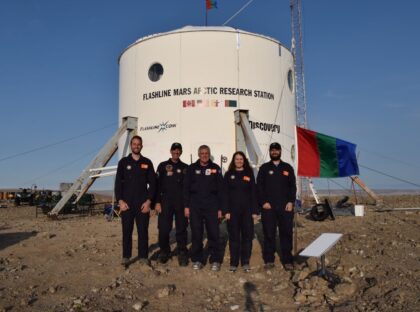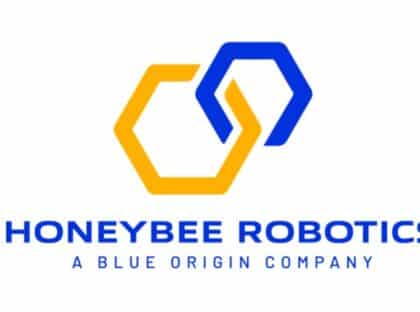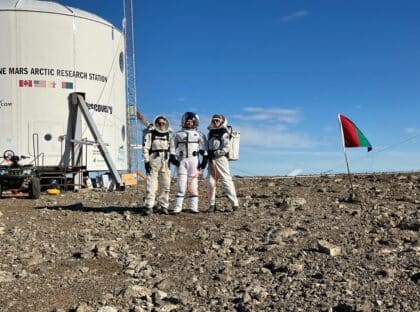
The Mars Society is pleased to announce the successful completion of the latest mission to the Flashline Mars Arctic Research Station (FMARS), which was conducted from July 15-30th, 2023. The international crew diligently worked to complete all mission objectives. Among their tasks was the essential maintenance and updating of the main Hab, which will pave the way for additional planned annual expeditions and further ongoing exploration and understanding of the Martian analog environment on Devon Island.
The crew, a five-person multi-national team from the United Kingdom, Australia, and the United States, spent the first week at FMARS working on upgrading the facility, with the remaining days used for a program of sustained geological and microbiological exploration, while working under Mars mission constraints, and also carried out a series of educational outreach initiatives (pre-sim/post-sim).
Members of Crew 15 included:
- Andrew Wheeler (Australia), a senior geologist, veteran analog astronaut, and crew commander.
- Terry Trevino (U.S.), an aerospace scientist and Ph.D. student, founder of the non-profit Space4All, and crew XO and scientist.
- Olivia Drayson (U.K.), a Ph.D. candidate and researcher, ESA project collaborator and crew mission science lead and scientist.
- Andy Greco (U.S.), an engineering team lead with Boeing (Seattle) and crew engineer.
- Caleb L. Pool (U.S.), a mechanical systems design engineer with Boeing (Seattle), a certified firefighter, pilot, and EMT and crew engineer.
Having arrived on Devon Island by plane, the crew unloaded supplies and started checking the status of the FMARS hab, which hadn’t been visited since 2017 when the Mars160 crew conducted an extended mission. Given the amount of expected upgrade work inside the FMARS facility, the team set up a small tent camp directly outside the station during the first few days on site.
The initial maintenance work during the first week included deep cleaning and resealing (waterproofing) of the hab interior, storing new food and supplies, servicing the ATV vehicles to be used by crew members, and ensuring that the main and back-up generators were operational. The crew accomplished all of these objectives through deliberate and diligent work.
Additionally, members of the crew installed one of SpaceX’s Starlink internet comms systems, which would be used by current and future crews to communicate with CapCom staff back “on Earth” and provide for live mission linkups for events and media opportunities. They also set up near the station a small wind generator to help supplement the electrical power required for daily FMARS operations.
Public outreach was also a focus of the crew’s mission. Several live broadcasts from Devon Island had been arranged with multiple international Mars Society chapters to enhance public understanding of the crew’s mission. Crew members also filmed and developed several short educational videos meant for distribution to grade school students globally.
Once the repair work was completed over the course of the first week, Crew 15 began their 7-day Mars analog simulation mission on Devon Island, with three primary scientific objectives: continuing the geological and biological fieldwork that was conducted during the MARS160 mission, monitoring the local water and radiation environment around the Haughton Crater, and creating a detailed map of the local features for future missions.
“The FMARS-15 expedition to Devon Island will turn out to be one of our most successful missions ever because of how the crew seamlessly worked together to reactivate the station, repair and exercise critical equipment, and catalogue what we have available there. The science work they completed is contributing to the overall body of analog research findings on Devon Island, including contributing to the science results of the Mars 160 crew, which we will be publishing later this year. Also, the Mars Society’s volunteer-driven Mission Support team has demonstrated our ability to expertly handle the transport, gear, and other logistics involved in a mission such as this, working with partners up and down the North American continent. It is clear to us that there is major demand for our type of Arctic analog station expedition that provides unique research opportunities. We look forward to working with the global analog research community and our partners to provide these opportunities to many in the future,” said James Burk, Mars Society Executive Director.
Commenting on the mission, Mars Society President Dr. Robert Zubrin said: “After six years of being dormant in the Arctic, we now have Flashline Station back. Hats off to the FMARS-15 crew!”
To learn more about the Mars Society, its analog research program, and how you could get involved as a member, volunteer, or donor, please visit: www.marssociety.org. A full report by the FMARS-15 crew about their mission to Devon Island will be presented during the 26th Annual International Mars Society Convention at Arizona State University in Tempe, AZ October 5-8, 2023. Registration and the Call for Papers are now open at www.marssociety.org.


